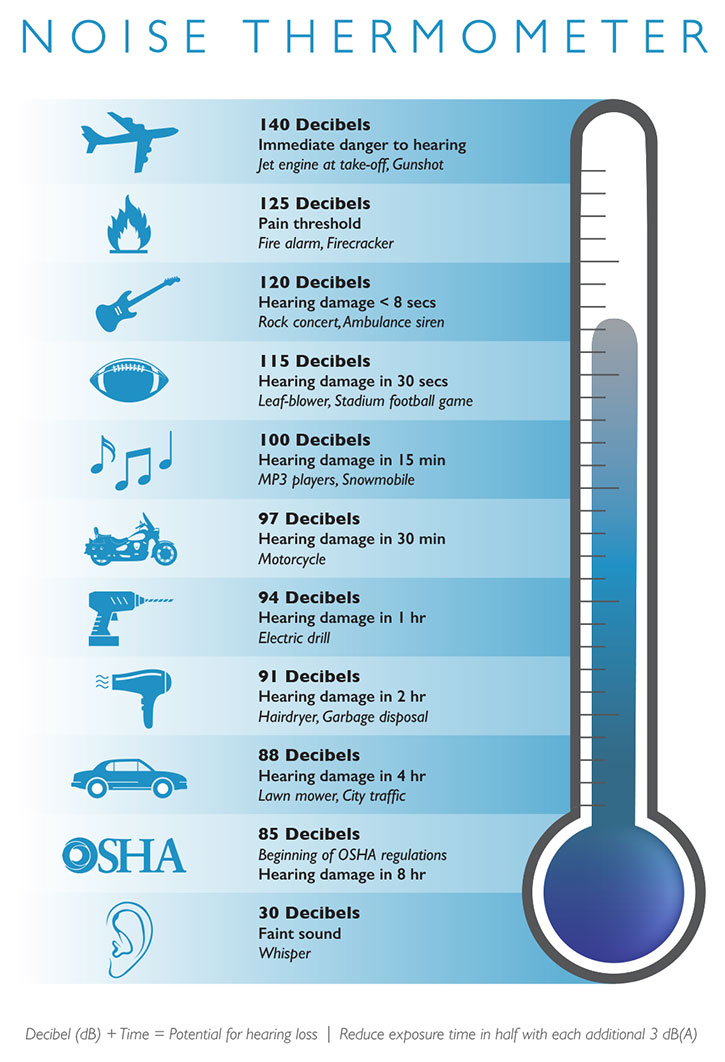While many are likely aware that hearing loss can come with aging, many may not be aware that prolonged exposure to loud noise will damage hearing. Every day we encounter sound at safe levels from things like the television or dishwasher. However, sounds that are very loud and last over an extended period can have damaging effects on our hearing, causing noise-induced hearing loss (NIHL). NIHL can be immediate if the sound is excessively loud as in firework blasts or it can occur over time from repeated exposure to noise such as machinery, power tools, or loud music. The most important thing is that noise-induced hearing loss can be prevented.
Here are some examples of risky noise situations that you should consider:
 Exposure to harmful noise can occur to anyone form children to adults and can be temporary or permanent in one or both ears. One study estimated that as many as 1 in 4 (24%) of U.S. adults may have NIHL.1 Other research estimates that as many as 17 percent of teens from 12-19 have configurations in their hearing test results that may indicate NIHL.2
Exposure to harmful noise can occur to anyone form children to adults and can be temporary or permanent in one or both ears. One study estimated that as many as 1 in 4 (24%) of U.S. adults may have NIHL.1 Other research estimates that as many as 17 percent of teens from 12-19 have configurations in their hearing test results that may indicate NIHL.2
Sound is measured in units called decibels. Sounds at or below 70 decibels (dB), even after long exposure, are unlikely to cause hearing loss. However, long or repeated exposure to sounds at or above 85 dB can cause hearing loss. The louder the sound, the shorter the amount of time it takes for NIHL to happen.
The critical factors for noise exposure are simple: how loud is the noise; how close it is to you; and how long does it last. A good rule to follow is avoid noises that are too loud, too close or for too long. If you are unsure how loud your environment is, downloading the free NIOSH Sound Level Meter App to your smartphone can give you a quick read of the surrounding volume levels and let you know if the environment is unsafe for your hearing.
When you are exposed to loud noise over a long period of time, you may slowly start to lose your hearing. Because the damage from noise exposure is usually gradual, you might not notice it, or you might ignore the signs of hearing loss until they become more pronounced. Over time, sounds may become distorted or muffled and you might find it difficult to understand other people when they talk or you have to turn up the volume on the television. You may also experience tinnitus, a ringing or buzzing in your ears. The damage from NIHL, combined with aging, can lead to hearing loss severe enough that you need hearing aids to amplify the sounds around you to help you hear, communicate, and participate more fully in daily activities.
Protect your hearing by knowing the signs of NIHL and avoid environments that are too loud or last too long. If you need to be around loud sound, wear hearing protection such as foam or reusable ear plugs, and for very loud environments, wear noise-blocking earmuffs. If you experience any of the signs of NIHL, see an audiologist who can test your hearing and determine of your loss in due to noise exposure.
For more information visit hearing.org